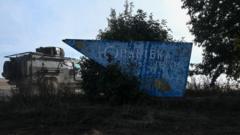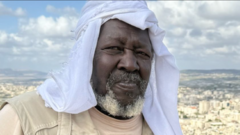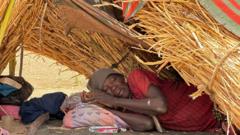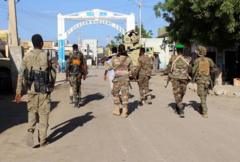In Syria's Alawite village of Sanobar, an accused civilian fighter claims his group, which conducted killings under government oversight, was in contact with security forces. Human rights organizations report high civilian casualties as sectarian conflicts escalate following insurgent attacks. The incidents raise questions about government accountability and the protection of minorities.
Sectarian Violence in Syria: Eyewitness Claims Link Armed Civilians to Government Forces
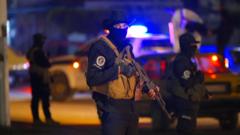
Sectarian Violence in Syria: Eyewitness Claims Link Armed Civilians to Government Forces
An accused participant in the killing of Alawite civilians reveals coordination with Syrian security forces during a wave of violence that shocked the coastal region.
In the coastal village of Sanobar, Syria, one man implicated in the lethal sectarian violence that unfolded two months ago has come forward with allegations that he and fellow armed civilians were under the supervision of government security forces while targeting Alawite individuals. Abu Khalid, one of those accused, stated in an interview that his actions on March 7, alongside a group of civilians, were coordinated with the Syrian General Security department and were aimed at retaliating against former regime insurgents.
According to Abu Khalid, the General Security instructed him not to harm locals but to react defensively against armed insurgents. However, he later filmed himself shooting a local resident, Mahmoud Yusef Mohammed, claiming him to be an insurgent. Contrarily, video evidence contradicts his assertion, as it shows no signs of Mahmoud being armed.
As the situation intensified, independent human rights groups estimated nearly 900 civilians, predominantly Alawites, lost their lives to pro-government forces in the coastal region during early March. The Alawite sect, which constitutes about 10% of Syria's population, has often found itself on the defensive as the country's complex sectarian dynamics evolve following the ousting of former President Bashar al-Assad.
Reports indicate that in the wake of insurgent assaults, armed groups have taken to executing Alawite civilians, revealing an alarming escalation of sectarian violence. Witnesses recounted harrowing stories of armed men threatening families and executing innocent civilians. Notably, Abu Khalid's admission of filming his violent actions struck a chilling note regarding accountability amid the ongoing chaos.
As survivors grapple with the grief of lost loved ones, the local government's response has raised concerns. Although the authorities have promised investigations and the arrest of responsible parties, skepticism lingers regarding their ability to bring justice in a region steeped in fear and division. The violence in Sanobar has not only devastated the local populace but also threatens the fragile peace in Syria, where various ethnic and religious factions are under increasing strain.
Government officials, while acknowledging that some factions partaking in the violence were acting independently, affirmed a commitment to restore order. Amid this turmoil, the future of not just Sanobar, but the broader Syrian landscape remains uncertain, with many minority communities asking whether genuine security and impartiality can be established in the country's ongoing recovery from disorder and bloodshed.


